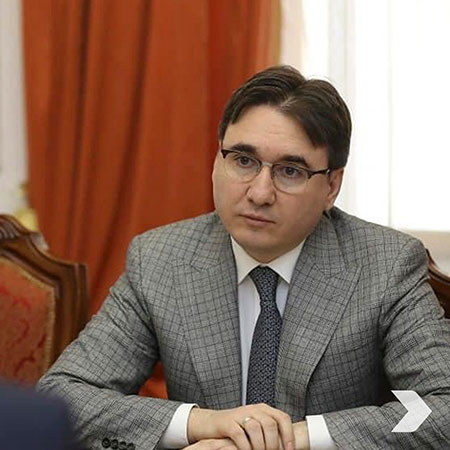Armen Gevorgyan Gives a Speech at PACE Committee Meeting: Green Public Administration Should Become the Synonym of a Valuable Envir
The member of the RA NA delegation to PACE, the NA deputy of the Armenia Faction Armen Gevorgyan took part in the meetings of PACE Committee on Social Affairs, Health and Sustainable Development. The MP gave a speech at March 16 Meeting.
“Dear committee members,
Within the framework of the European Committee on Democracy and Governance, two working groups have been established – one on the green public administration, the other on governance. Both working groups held their first meetings. I represented PACE as General Rapporteur on local and regional authorities. From the point of view of the interests of our committee, a special focus for me is to relate new approaches to multi-level governance and green public administration with the process of achieving the sustainable development goals under the 2030 agenda.
Read also
In regard with green public administration (GPA) my general starting point was the following: to meet the new challenges of the democratic societies the public administration should be at least: Reliable, Digital, Green. The transformations in public administration have to be primarily intended to influence the change in the way of thinking of its actors. Green or digital public administration cannot and should not be perceived only in the context of the latest technological solutions. Issues of leadership and political motivation for the green agenda are becoming relevant. Green issues are not only the challenges for green parties.
A new challenge for full-fledged green public administration may be the emerging situation of energy security. Many countries are forced to reconsider their previous decisions regarding the green transition. At the same time many green decisions are perceived by part of society as expensive and affecting their well-being, and thus cause their negative reaction and resistance new environmental solutions.
At the same time, it is crucial that the understanding of the essence and the main problems are the same for all international organizations. Many incentives for the development of green agenda are shaped and come to the national level from international organizations and supra-national institutions, which have the capacity to address the challenges more globally and transnationally. It will be important to assess the relations between the quality of green governance and the level of democratic development of the member states.
I would like to share with you my observation that the green public administration in the context of implementation of the right to a healthy environment is perceived with a certain skepticism.
It would be expedient for our organisation to approach this topic from the point of view that the implementation of the human right to a clean, healthy and sustainable environment is one of fundamentals for achieving the goals of sustainable development. In this regard, an important task is to conduct a survey to assess the situation in the member states of the organization on the introduction of the right to a healthy environment as one of the fundamental human rights, or in other words, the implementation of the recommendations of the Committee of Ministers. I think it will also be interesting to determine the difference in the pace, forms and content of GPA between the various states of our organisation.
In addition, it would be timely to hold joint hearings on this topic together with the PACE Human Rights Committee to understand where and what problems arise in this matter: legal, ideological, economical or internal political.
In addition, it will be useful to suggest the monitoring committee consider including the issue of the state of affairs in green governance as a mandatory subject for monitoring missions and reporting.
Dear colleagues,
Green public administration should become the synonym of a valuable environment in which public and private, local and civic efforts are integrated, practical and universally recognized rules of the game are established. GPA should also demonstrate the capacity for the unity of understanding of problems and their causes and provide a consensus approach in decision-making.
In the context of green public administration, multi-level governance can become one of the main mechanisms that will ensure effective and timely approach. In case of environmental issues, we face a local, national, regional and global challenge, which requires everyone to play their part.
It will also be useful to put green public administration in the context of good democratic governance inspired by “three R” approach:
One, GPA must be responsive, which means to encourage and maintain an honest and open room for discussing emerging problems and difficulties, there must not be closed topics or inaccessible gray zones.
Two, GPA should be responsible, which means, that the expected results, which will be determined as desired, should have clear criteria for evaluating their effectiveness, and their failure should cause consequences.
Three, GPA must be relevant, which means all decisions must be timely, resourced and consistent with Sustainable Development Goals are adopted.
Green public administration should avoid the practices of harmful compromises and double standards. Today, especially, compromises on climate and environmental issues are unacceptable, since the second key party namely the future generations, does not participate in their adoption. In this sense, the main expectation from the green public administration, could be described as a search for the necessary balance between technological progress of mankind and exclusion of new potential damages to nature.It is also a big challenge when the modern technologies provide fresh means not only for wars and hostilities, but open a window for deep confrontation in new areas of strategic influence – in the Arctic and in the space.
In conclusion, I would like to inform the committee that a Conference “Green public administration in the context of good democratic governance,” organised by the European Committee on Democracy and Governance (CDDG) in cooperation with the Icelandic Presidency of the Committee of Ministers will take place in April 2023.
The conference will, among others, showcase good practice from member States and international organisations, discuss opportunities and challenges for public administration at local, regional and national level with a view to identifying recommendations. The proceedings and results of the conference will feed into a Report on Green Public Administration,” the deputy said.
National Assembly of the Republic of Armenia






















































